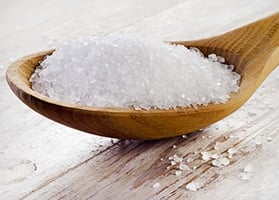-
Proposed FDA Sodium Reduction Goals Present Permeate Opportunities
By John Klees June 8, 2016- Tweet
 Proposed voluntary sodium reduction goals put forth June 1 by the U.S. Food and Drug Administration (FDA) reflect that Americans are getting too much sodium in their diet. FDA’s suggested short and long-term goals would enable food companies and restaurants to gradually adjust sodium levels using innovations like incorporating permeate as a cost-effective, sodium substitute.
Proposed voluntary sodium reduction goals put forth June 1 by the U.S. Food and Drug Administration (FDA) reflect that Americans are getting too much sodium in their diet. FDA’s suggested short and long-term goals would enable food companies and restaurants to gradually adjust sodium levels using innovations like incorporating permeate as a cost-effective, sodium substitute.The new guidelines offer suggested sodium targets for 150 different food subcategories in addition to the daily recommendation of 2,300 milligrams. The FDA had these sodium reduction goals under consideration for almost a decade, as the link between sodium intake and hypertension became increasingly evident. A diet high in salt has been shown to contribute to heart attack, stroke and even heart failure, together the leading causes of death in Americans. These revelations, and an overall trend to eat healthier, have prompted some consumers to try and limit their daily sodium intake.
Sodium reduction initiatives aren’t limited to the United States. There are 75 countries working to reduce the sodium intake and 39 have set sodium target levels for one or more processed foods. The World Health Organization has recommended a global reduction in sodium intake that is close to the FDA targets.
Currently some food companies are making progress but part of the problem identified by the FDA has been the focus on making a few foods very low in sodium, instead of making most foods a little lower in sodium. The FDA proposal would provide the industry common targets across a broad range of foods.
Permeate, also referred to as dairy product solids, is a natural substitute for sodium in some popular foods on the market today like baked goods, soups, sauces, dry mixes, and meats. In fact, permeate has proven to be a unique tool in the trend to reduce sodium. The dairy ingredient saw its use in new food products increase by over 64% between 2010 and 2014, signifying that food manufacturers and processers are increasingly aware of the need to find healthier alternatives to a diet inundated with sodium and look to permeate as a viable solution.
Research conducted by the Wisconsin Center for Dairy Research on behalf of the U.S. Dairy Export Council show that many formulations, with the addition of permeate, can have their sodium content reduced by 50-70% while still retaining the salty flavor that consumers have come to crave. A permeate substitution has been proven effective in a diverse array of food products and prepared meals.
Permeate has other functional benefits in addition to its use as an alternative to sodium. From browning in baked goods to flavor enhancement in meats and soups, permeate is a cost-effective and valuable addition to many formulations. Visit ThinkUSAdairy.org to learn more about this versatile ingredient.
Most Popular Posts
Find by Date, Geography and Dairy Product
- September 2015 (6)
- December 2015 (5)
- September 2016 (5)
- December 2016 (5)
- June 2017 (5)
- February 2015 (4)
- March 2015 (4)
- April 2015 (4)
- May 2015 (4)
- June 2015 (4)
- July 2015 (4)
- November 2015 (4)
- January 2016 (4)
- March 2016 (4)
- June 2016 (4)
- August 2016 (4)
- October 2016 (4)
- November 2016 (4)
- February 2017 (4)
- March 2017 (4)
- April 2017 (4)
- November 2013 (3)
- October 2015 (3)
- February 2016 (3)
- April 2016 (3)
- May 2016 (3)
- July 2016 (3)
- January 2017 (3)
- May 2017 (3)
- July 2017 (3)
- August 2017 (3)
- September 2017 (3)
- October 2014 (2)
- August 2015 (2)
- October 2017 (2)
- December 2017 (2)
- July 2020 (2)
- December 2013 (1)
- February 2014 (1)
- June 2014 (1)
- August 2014 (1)
- September 2014 (1)
- November 2014 (1)
- November 2017 (1)
- January 2018 (1)
- February 2018 (1)
- May 2018 (1)
- June 2018 (1)
- July 2018 (1)
- August 2018 (1)
- September 2018 (1)
- October 2018 (1)
- November 2018 (1)
- February 2019 (1)
- March 2019 (1)
- April 2019 (1)
- July 2019 (1)
- October 2019 (1)
- March 2020 (1)
- April 2020 (1)
- June 2020 (1)
- October 2020 (1)
- November 2020 (1)
- March 2021 (1)
- April 2021 (1)
- June 2021 (1)
- August 2021 (1)
- February 2022 (1)
- June 2022 (1)
- September 2022 (1)
- October 2022 (1)
- November 2022 (1)
- February 2023 (1)
- April 2023 (1)
- USDEC Staff (65)
- Kara McDonald (24)
- Terri Rexroat (15)
- John Klees (15)
- Kristi Saitama (9)
- Angelique Hollister (8)
- Vikki Nicholson-West (8)
- Shannon Koski (8)
- Rohit Kapoor (3)
- Keith Meyer (2)
- Moises Torres-Gonzalez (2)
- Amy Foor (2)
- Alan Levitt (1)
- Tom Vilsack, President and CEO (1)
- Allison Guzman (1)
- Dacia Whitsett-Morrow (1)
- Ryan Hopkin (1)
- Matthew Pikosky (1)
- Ross Christieson (1)
- Nina Halal (1)
- Mary Wilcox (1)
Keywords
- 2018 beverage trends (3)
- 2018 Food Innovations (1)
- 2018 food trends (3)
- Asia (1)
- Avian Influenza (1)
- Award-winning cheeses (3)
- Awards (2)
- Back-to-School (1)
- Baked Goods (1)
- Bakery (1)
- Beer (2)
- Beverage (5)
- Breakfast (1)
- Butter (6)
- Casein (2)
- Cheese (48)
- cheese flavors (2)
- Cheese Pairing (3)
- Cheesemaking (5)
- Child Nutrition (3)
- China (6)
- Clean Label (6)
- Common Food Names (1)
- Consistent Supply (3)
- Consumer Insights (48)
- Consumer Promotional Tools (1)
- Consumer Trends (15)
- Contest (1)
- craft foods (2)
- Cultured dairy (1)
- Dairy (17)
- Dairy Detective (4)
- Dairy Fat (1)
- Dairy Futures and Options (3)
- Dairy Ingredients (82)
- Dairy Ingredients Symposium (1)
- Dairy Permeate (1)
- Dairy Product Solids (1)
- Dairy Production (5)
- Dairy Proteins (35)
- Dairy Resources (23)
- Dairy Trade (1)
- Dairy Trends (10)
- Dessert (1)
- Digestive Health (2)
- Donna Berry (1)
- Drinkable yogurt (1)
- Early Childhood Development (1)
- Educational Tools (1)
- Egg Replacement (2)
- Egg Substitution (1)
- Egypt (1)
- Energy (4)
- Environment (2)
- Europe (1)
- Export Data (8)
- Exports (7)
- Farming (1)
- Flavor Trends (1)
- Follow-on Formula (1)
- Food Aid (2)
- Food and Beverage Trends (7)
- Food Production (3)
- Food Technology (3)
- Foodservice (2)
- Free From Claims (1)
- Full-fat Dairy (1)
- Geographical Indications (GIs) (1)
- GHG (1)
- Global (74)
- Global Dairy Market (2)
- Global Demand (2)
- Global Market (4)
- Global Supply (1)
- Greek Yogurt (1)
- Gulfood (2)
- Gut Health (1)
- Health (1)
- Healthy Aging (8)
- Healthy Indulgence (1)
- Heavy Cream (1)
- High Quality Protein (11)
- Holiday Dessert (2)
- Holidays (1)
- IFT (7)
- IFT2016 (1)
- IFT2018 (2)
- Infant Formula (1)
- Infographic (3)
- Innova Market Insights (4)
- Innovation (2)
- Japan (7)
- Lactose (8)
- Lactose-free (1)
- LinkedIn (1)
- Malnutrition (2)
- Market Insights (67)
- Methane (1)
- Mexico (2)
- Micellar Casein (3)
- Middle East (2)
- Middle East/North Africa (9)
- Milk (8)
- Milk Permeate (2)
- Milk Powder (10)
- Milk Protein (19)
- Milkfat (5)
- Millennials (3)
- MPC (4)
- MPI (1)
- Muscle Maintenance (1)
- Muscle Recovery (2)
- Muscle Synthesis (2)
- NAFTA (1)
- New Product Introductions (1)
- New Year's Resolutions (1)
- Nonfat Dry Milk/Skim Milk Powder (4)
- Nutrition (21)
- Nutrition Research (14)
- Obesity (1)
- Overnutrition (1)
- Permeate (19)
- Price Volatility (2)
- Probiotics (2)
- Product Innovation (3)
- Protein (33)
- Prototypes (1)
- Record (3)
- Reduced-Fat (1)
- Research & Data (1)
- Resources and Tools (8)
- Risk Management (3)
- RTD Coffee and Tea (1)
- Salon Culinaire (1)
- Salt Substitute (1)
- Savory Flavors (1)
- Science and Research (3)
- Service Providers (1)
- Simple Ingredients (1)
- Singapore (1)
- Skimmed Milk Powder (2)
- Smoothies (1)
- Snack Trends (3)
- Snacking (4)
- Snacks (1)
- Sodium (3)
- Sodium Reduction (4)
- South Korea (3)
- Southeast Asia (9)
- Sports Nutrition (4)
- Stewardship (1)
- Student Competition (1)
- Supplier Directory (1)
- Supply (4)
- Sustainability (7)
- Sustainability Awards (1)
- Sustainable Nutrition (7)
- Technology (1)
- ThinkUSAdairy (2)
- Toddler Formula (1)
- Trade Data (1)
- U.S. Dairy Industry (11)
- U.S. Dairy Industry Growth (6)
- U.S. Dairy Partnerships (4)
- U.S. Dairy Products (15)
- UK (1)
- United Arab Emirates (5)
- United States (10)
- USDEC Events (44)
- Value (3)
- Vietnam (5)
- Volatility (1)
- Volume (4)
- Waste Reduction (1)
- Weight Management (6)
- Whey (14)
- Whey Ingredients (3)
- Whey Permeate (5)
- Whey Products (3)
- Whey Protein (47)
- Whey Protein Concentrate (3)
- Whey Protein Isolate (5)
- Whole-milk dairy (1)
- Wine (2)
- World Championship Cheese Contest (1)
- World Cheese Awards (2)
- World Milk Day (1)
- WPC (4)
- WPI (1)
- Yogurt (6)


